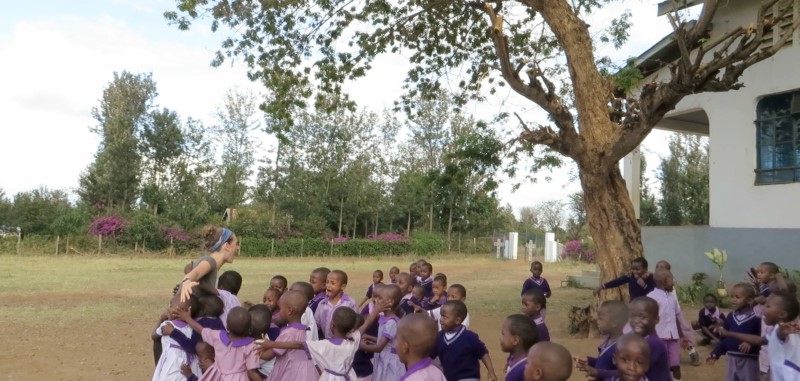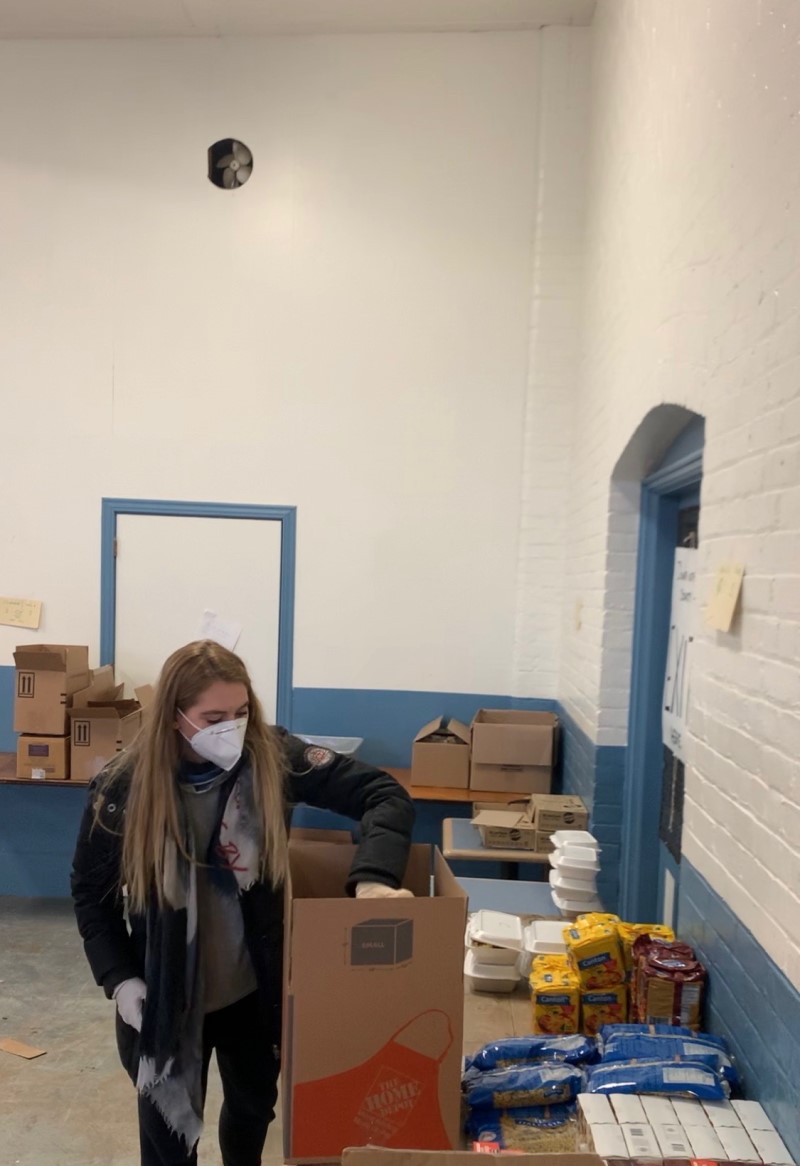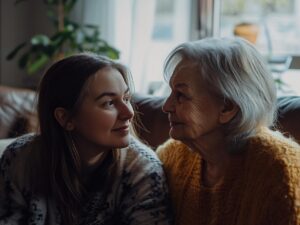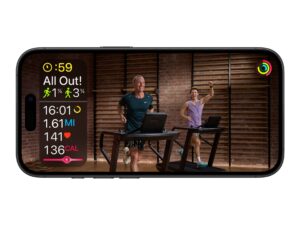Jenna Tabatznik is cause-oriented. Whether helping on a world-wide scale with Amnesty International or locally through the COVID Care Collective, she is a woman on a mission. She has a powerful sense of purpose which came directly from her upbringing. Born in London, England and raised in Toronto, she always knew that she wanted to be at the center of change.
She ending up moving back to London after graduating from Western University to work for a grant-making foundation in the human rights law portfolio [at Bertha Foundation]. Tabatznik then moved on to her second job at Amnesty International in global strategy and impact. This motivated her to go on and do a Human Rights Masters at Goldsmiths, University of London. She left Amnesty in November 2019 through a voluntary redundancy plan.
When COVID-19 hit, she wanted to be close to her family in Toronto, mostly out of fear that her family may get sick, and she would be abroad and not be able to visit. She began working with the COVID Care Collective, putting her passion for helping people that fall through the cracks of society into action. She is dedicated to what she does, has social activism in her genes and is our latest #WomenInspiringWomen.
You have a history of working with organizations who are trying to make a difference. What motivated you to take this route with your career?
I was raised by two ex-South African parents. Both grew up in Apartheid. My dad was a human rights activist and was thrown in jail twice for fighting for black rights in South Africa. I was raised with this sense that is systems of justice don’t feel right, you have the power to step in and change these. At dinner time, our conversations never shied away from social issues. From a young age. I wrote a paper in grade three on what you wanted to be when you grow up. I said a human rights activist. That never left me. I always knew that I wanted to do something in human rights. I’ve always known that I wanted to fight systems of injustice.
I visited South Africa when I was 11 years old and we went to see the townships left over from Apartheid. The vast inequality from where I grew up and where these people had grown up has never left me. I couldn’t unsee what I saw. That had a huge impact on my life. I came back from trip and sat in my room for two weeks trying to process this wave of emotion. From that moment, I knew that I had to do something about it.
You have not only been part of organizations like Amnesty International, but you also taught in Tanzania in 2013. As a woman, what was it like to live in a country where human rights defenders can be attacked, freedom of expression is prohibited many groups including the LGBTQ+ community are targeted?

I was in a rural community in Tanzania so I didn’t experience those human rights issues first hand. I was working in a school with a class of 50 kids ages 3-5. Kids don’t have to pay fees for school, but they do have to be able to afford school uniforms, their own books and they have to be able to get to the school. That has so many knock down effects in whether they can access education or not. In a class of 50 kids, you have to teach to the middle ground. There was one student who was falling far behind and when there was another woman teaching there, I would pull him over and go through the alphabet and numbers with him. It’s so hard to know why a kid is falling behind. None of the kids in the class wore glasses or hearing aids which may have an impact on whether they could grasp what the teacher was saying.
There were so many issues. The government isn’t investing in education. People really fall through the cracks. Another major issue is that the primary school is taught in the native language and when they move onto secondary school, it’s taught in English. If you are in a class of 50 and you fall behind early on, and you don’t have a good English teacher, the odds of you keeping up in secondary school are slim. There are so many educational and government issues that were very apparent in my time there.
Tell us a little about the COVID Care Collective.
The COVID Care Collective started out as a food drive, and that was at the beginning of March before the government announced the emergency benefits. People were experiencing food insecurity for the very first time. Food banks did have the capacity to help and were willing to support more people. We figured out that even though food banks should be people’s first call when they are experiencing food insecurity, there are so many people that apply and many more that have needs that food banks can’t cater to. For example, if you have an allergy, dietary restriction or a religiously prescribed diet, it’s unlikely that food banks will be able to cater directly to your needs. Our unique model allows people to tailor their grocery order to their specific needs. We also supply baby formula, some medication and diapers which food banks don’t always have in stock.
You took over your role at COVID Care Collective when you were in self-isolation. Much of what groups do to fundraise involves relationship building. What challenges have you faced having to do most of your communication virtually? How has our new virtual reality changed how we create emotional connections?

It’s definitely been a challenge because everything is virtual. Even when we do have connection as volunteers are dropping off parcels to recipients, everything has to be curbside. We’ve invested a lot in how people connect virtually. We are using a [mutual aid] platform called Purposely which connects our recipients and volunteers so they can match and see who needs help in their neighbourhood. The platform manages the recipient/volunteer connection in a simple way. We’ve had to work and be agile in the new reality. With fundraising, it all comes down to telling compelling narratives, reaching out to your community, personal and extended networks. It is about saying what you are doing, who these people are that you are helping and why you are doing what you are doing. I think people responded well to that, even given this crisis.
People have limited incomes right now. How is this impacting your fundraising ability?
It has hugely affected our fundraising ability. People don’t have disposable incomes right now, and we completely understand that. We do want people to get involved in whatever way they can. Its people’s time too that really matters. If they want to join our network of volunteers to do good in this time of uncertainty, we welcome the help.
There are other ways that people can help if they can’t donate. They have their own networks, and it’s really the power of the people that increases fundraising ability. If they share our Go Fund Me on their Facebook page or other social media and tried to target people who may have the funds to help, that’s just as important as donating themselves. We aren’t looking for huge donations. It’s about people in Toronto coming together and recognizing that people are suffering right now. If a lot of people donate a little bit that can be hugely impactful.
We’ve teamed up with a bunch of Toronto based businesses because they want to get involved and help as well. They will either donate proceeds from sales or include a donate link on their page to broaden our reach.
You have probably been part of and heard stories though the COVID Care Collective that have touched your deeply. Tell us about one of those stories.
A few weeks ago, we had helped this recipient who was a newcomer to Toronto. She was living in a refugee shelter and about to move into her own apartment. We helped her get some groceries and she was blown away by the support that she had been given. All she wanted to do was help us and be a volunteer. Sadly, she was diagnosed with COVID-19, but her willingness to help out did not change whatsoever. She sent me a message saying that she is fully recovered and she wants give back and help her community.
The one tricky thing is that we ask our volunteers to front the cost of the grocery order and we reimburse them after the delivery is complete. But, there are so many ways for our volunteers to get involved. One thing that I’m discussing with her is to let other refugees and newcomers know that we are here to help them. She can be a front runner in that message since she has received support from us and she’s very connected with the newcomer community in Toronto.
We focus our time on those that have fallen through the cracks of government aid or who are ineligible to apply for a Canadian Emergency Response Benefit. A lot of those people are newcomers and refugees. They need help and may have been unemployed at the outbreak and their needs have not dissipated.
Our lives have all changed drastically as a result of COVID-19. What life lessons will you take away from the pandemic?
It is such a crazy time and it is so important to have these little moments of gratitude. One thing that has become very apparent to me is how many people have reached out and said that they want to help out our communities in whatever way they can. We launched our platform just a short while ago and we have 250 volunteers already. That has been so amazing. It just shows how many people want to get involved and do good in their communities.
Another thing that has been such a big takeaway for me is how powerful working in a collective is. We are the COVID Care Collective and right now, we have nine backend volunteers. Everyone is involved in decision making, strategy design and working through issues together. We’re just a group of people who kind of knew each other in various times of our life, who reached out via social media and decided that we wanted to get involved. We all have different backgrounds. Some people have a history of working in non-profit, in finance, in social work – whatever their experience is. Coming together with just one mission has been incredible.
A personal life lesson that I will take away is just how important family is and how important these connections are. When so much is taken away from you, just to know that you have people to support you and are really there for you, has been meaningful. I know that I’ll nurture those relationships a lot more moving forward. Even through virtual reality we are all connected.
What you are doing is truly inspiring. Who inspires you?
There are so many people that inspire me daily. My parents have inspired me. Our volunteers have been so inspirational. There are so many people that have put themselves out there in the heart of the pandemic. The health care workers, the people that work in grocery stores and drug stores who are helping us live a more comfortable life while putting themselves at risk is also inspirational.
You can support the COVID Care Collective through their Go Fund Me page.






